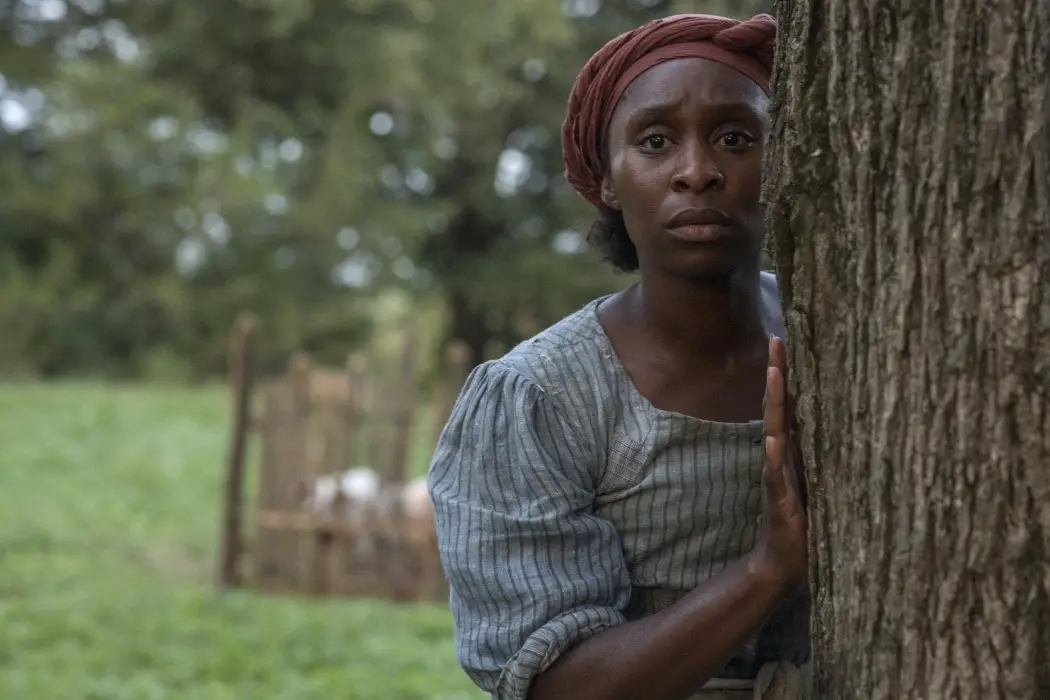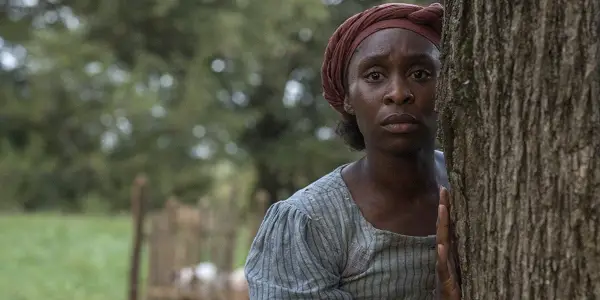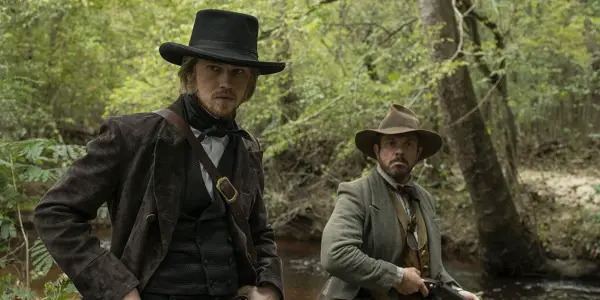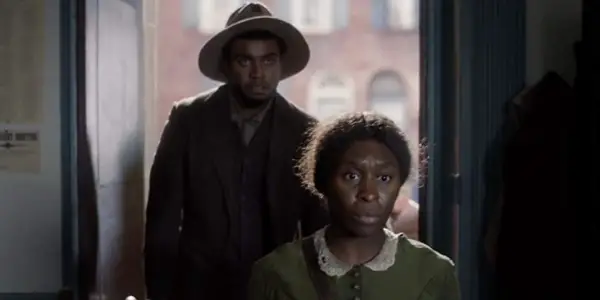HARRIET: Harriet Tubman Biopic Is Frustratingly Routine

Andrew Stover is a film critic/writer from the Chicagoland. His…
The reputable American abolitionist and Civil War hero Harriet Tubman somehow has not been a subject of a major feature film until now, while male figures were granted with such honor; it’s discouraging, to say the least. Brimming with such commendable grit and empathy, Harriet Tubman is a victim of slavery, until evolving into one of slavery’s most formidable adversaries. Co-writer and director Kasi Lemmons (Eve’s Bayou) laudably attempts to tackle Harriet’s celebrated life, but this routine biopic doesn’t match up to Tubman’s ardent bravery.
The year is 1848, and Harriet (Widows’ Cynthia Erivo) is enslaved to Edward Brodess (a stern Mike Marunde) and currently goes by “Minty” in a plantation in Bucktown, Maryland. Grueling hours, unrelenting torment and disdainful enslavers, Minty endures the depraved torture with her family by her side, and her husband Junyah (CJ McBath) lives as a free man down the road. Love surrounds Minty as she weathers the pain, but the sight of freedom becomes clearer when her owners are planning to sell her, which will separate her from her family and husband. So she decides to flee her own family on her own terms, in an audacious leap for liberation.

Venturing on a hundred-mile journey on foot to Philadelphia, she makes the trip alone — or maybe not, speaking as she recalls hearing the voice of God, which guided her through the unsettled escapade. On a side note, the dark blue light of the night and the autumn beauty of the landscape is gorgeously immersive. In Philadelphia, she’s introduced to abolitionist William Still (Leslie Odom Jr.) and changes her name to Harriet Tubman.
Filled with light suspicion and grand awe of Harriet’s precarious journey, William finds it outrageous how Harriet told him she followed the voice of God to freedom (thinking it must be partial brain damage). William brings Harriet to stay with Marie Buchanan (a fabulous Janelle Monae), an abolitionist who was born free but provides refuge and jobs for the formerly enslaved people.
A year has passed, and Harriet now has a paid gig as a housemaid and is free from any shackles. But she finds her life incomplete without her husband and family by her side, so she risks her freedom and returns to Maryland to bring them home. Taking another wife and having a child, Junyah has moved on, but Harriet brings along a couple of her willful family members and friends. Bringing home nine enslaved people to freedom, she joins the Underground Railroad and becomes one of the most renowned freedom fighters in history. In her lifetime, she rescued around 70 enslaved people.
An Extraordinary Story, A Routine Cinematic Journey
Harriet Tubman is a historical figure whose story should be documented and registered by everyone. There’s a lot of fire and wisdom to learn from her story, her voice and her stickability. Harriet stood up to slavery with words and with actions; she spoke of the vileness of slavery and physically liberated dozens of enslaved people. She motivated others, she angered others who were blinded by unavailing contempt, and she did what others thought to be impossible. This latest biopic, titled Harriet, is finally telling her story, but this isn’t the ideal path to take.
The movie doesn’t carry the emotional weight, prompting a fierce Cynthia Erivo to blossom without being nurtured with all of the needed script ingredients to vivify the film’s emotionality. On one hand, Harriet’s pluck is, on paper at least, engaging; on another hand, this is the encapsulated version of her life that doesn’t acquit with the necessary potency or urgency. As far as I’m concerned, Harriet Tubman’s narrative shouldn’t be belittled to casual filmmaking, which is almost always easy to digest, airily applaud and more importantly, make.

Before she was Harriet, the fearless and implacable freedom fighter, she was Minty, an enslaved woman ensnared in chains and exploited for being different. Any tale of slavery is disheartening, but Harriet’s tale is more of a quest for freedom. The savagery of slavery is still principally explored in Harriet, but this is about enslaved people breaking away from the chains, overcoming adversity and demanding their right to live. Erivo deploys infectious passion, whereas the presentation of the movie is achingly conventional and brisk, not wholly hitting the emotional kernels of Harriet’s various stepping stones to self-fulfillment — and it’s safe to say Harriet won’t reach a state of serenity until slavery is vanquished once and for all (“I would give every last drop of blood in my veins until this monster called slavery is dead”).
Harriet’s escape scene is largely suspenseful, particularly because of the circumstance, and how we cognize and fear the threat alongside Harriet. She’s forced to jump off a bridge to avoid capture, and now more soiled and beaten than she was before, she persists on with even more resolve. Steered by God and the luminous North Star, Harriet finally arrives in Philadelphia, being told by a fellow freed black man to “Walk like you got a right to!” A year of being away from her husband and family marks her return to the South. One successful rescue mission leads to others. Harriet embarks on a ceaseless succession of round-trip treks down to the South, wearing a disguise and the nickname “Moses,” rescuing more and more enslaved people with each remarkable expedition.
The parlous outings are hindered by a guarded bridge, an unmeasured river, vexing feelings of self-doubt, and enslavers. Most obstacles feel warranted, but the visibly inflated confrontations between the enslavers look to be taken straight out of a random chase movie. Shrouded from her eyesight but apparently whispering in her ear, the omnipotent God nonverbally speaks to Harriet throughout the picture. Despite the risk of coming across as preachy, faith was an ample part of Harriet’s life, and it’s one of the more effective elements of her life converted to the silver screen.
Capture implies more scars and bruises, which plagues Harriet’s mind and rattles ours. Every peregrination is a risk, but the execution — from the soundtrack, the mood and the pacing — doesn’t take any risks or strives to be anything more than a television production. Beyond the euphonious gospel tunes, the soundtrack is weirdly applied and doesn’t align with the mood: it’s plaintive when it should be fretful, mellifluous when it should be forcible. The gauzy, blue-hued flashbacks of Harriet’s experiences are employed with haste and persistency, but with very little impact.
The rescue operations are always triggered by song and speech, sometimes effectively so thanks to Erivo, but tedium is bound to surface in some form. When the final act comes along, Harriet’s unwavering mettle is ill-treated: convenient set-up with the big bad villain in the woodlands, Harriet’s decision to show mercy (the moral high ground) and indulge some stagy delivery that’ll gratify audiences everywhere.
Well-Rounded Performances, Misguided Usage
Cynthia Erivo anchors the movie with her gripping performance as Harriet Tubman. Her delivery is firm and forceful, her clothes are suitably maculate, and her perseverance is translated through physical tribulation that is repeatedly outmatched by her character’s dogged, stiff-necked mentality. Erivo is high-powered — every tear is tactile and every enslaved person her character leads to freedom signifies a vital win in the fight for the abolishment of slavery. Playing a singer in Bad Times at the El Royale, Erivo’s singing voice is just as graceful here, belching out spiritual tunes (“Go Down”, “Moses” and “Wade in the Water”) with much-needed heart and purpose. Harriet’s voice carries with the wind, grasping the attention of nearby enslaved people, swaying them to join her on a hazardous journey northward.

Leslie Odom Jr.’s William Still is innocuous comedic relief, assuming a genial soul and an empathetic heart. But I can’t help but think he’s solely being used as a voice of reason for Harriet to silence or mock. Throughout, William misprizes Harriet’s courage and strength, and Harriet continually proves him wrong. Odom Jr. and Erivo interact in some rollicking banter, but there’s no vigorous connection beyond those little cheap quips and gambits of physical comedy. Janelle Monae’s Marie Buchanan wears a ravishing mien and offers assistance to Harriet, without any strings attached. Monae’s magnanimity appears genuine, but Monae isn’t given much to do.
The main enslaver is the son of Edward Brodess (who later dies), Gideon Brodess. Gideon (Joe Alwyn) is just as flinty as his father but most likely more reckless and ill-advised. He’s motivated to capture Harriet based on how they grew up together, how he believes he and his family owns her. Unfortunately, Gideon is a campy enslaver, an unrelenting villain driven by a half-baked obsession with the film’s prime subject. Nothing to see here but sheer incompetence on the character’s front.
Harriet Doesn’t Live Up To Its Subjects’ Astounding Lives
Harriet is a formulaic biopic that doesn’t take any creatively clever leaps to ensure this biopic deserves to be associated with the historical significance of Harriet Tubman. It’s crowd-pleasing enough to satisfy viewers looking for a quick morale boost, but it’s structured without diligence and exigency. A riveting lead performance from Cynthia Erivo isn’t enough to vitalize the film’s direction and configuration. Kasi Lemmons’ biopic isn’t brave, unlike the person it’s scrutinizing. But hopefully, this female-helmed biopic leads to more biopics about female leaders and fighters.
Have you seen Harriet? What did you think about it? Let us know in the comments!
Harriet was released in theaters in the US on November 1, 2019 and will be released in the UK on November 22, 2019. For all international release dates, see here.
Does content like this matter to you?
Become a Member and support film journalism. Unlock access to all of Film Inquiry`s great articles. Join a community of like-minded readers who are passionate about cinema - get access to our private members Network, give back to independent filmmakers, and more.
Andrew Stover is a film critic/writer from the Chicagoland. His film & TV reviews can be found on Film Inquiry & Film Threat.













